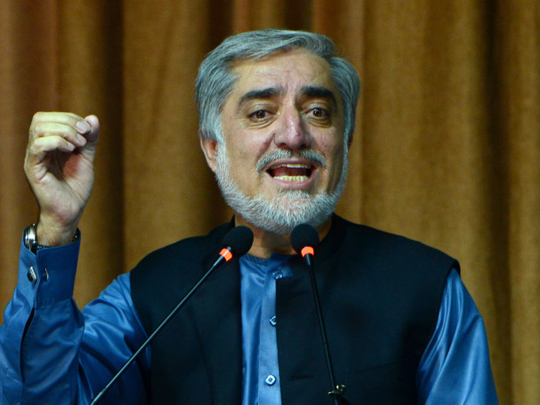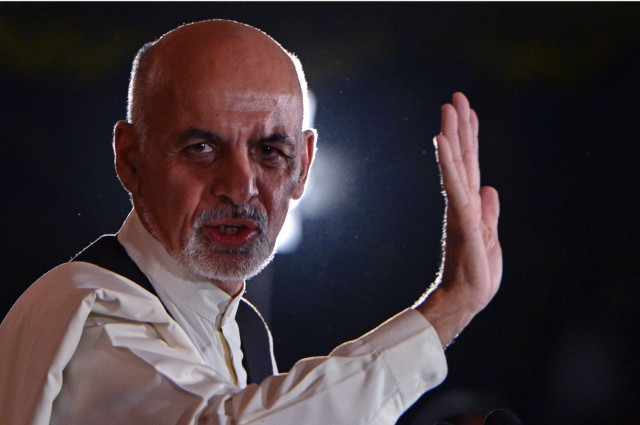
More than five months after the April 5 polling in Afghanistan’s presidential election, Afghan voters are still waiting to be told who won the polls.
The landmark election was supposed to lead to the first peaceful transfer of power in a country where change of government in the past has invariably been violent. The turnout had been high considering Taliban threats, insecurity and general disenchantment with politicians as 6.9 million men and women out of an estimated 12 million electorate cast their votes.
The first round failed to produce the winner among the eight candidates as none could get the mandatory 50 per cent of the polled votes. The run-off vote between the frontrunners, 53-year-old Dr Abdullah Abdullah and the 64-year-old Dr Ashraf Gani Ahmadzai, was held on June 14, but its outcome became a matter of dispute. Abdullah contested the Independent Election Commission’s (IEC) preliminary vote-count result that put Gani ahead.
The outcome was indeed bit of a surprise as Gani polled 56 per cent of the vote compared to Abdullah’s 43 per cent. Though the former was expected to do better in a straight contest because his fellow Pashtuns rallied to his cause in the second round of the polling, Abdullah’s share of the vote fell as he was shown to be losing by almost a million votes. In fact, the two leading candidates somehow switched positions in the span of two months as Abdullah had polled nearly 45 per cent of the vote in the first round of voting on April 5 while Gani was way behind despite being the runner-up with 32 per cent. Allegations of fraud followed and it wasn’t surprising because every election, presidential or parliamentary, held since 2001 in the post-Taliban period was allegedly rigged. The turnout recorded by the IEC also generated controversy as many doubted that more votes were polled in the run-off vote than the first round.
There is now a tense standoff amid concern that Afghanistan’s heavily-armed, multi-ethnic population could become even more polarised. Being an ethnic Pashtun, former World Bank official Gani had emerged as the representative of the majority ethnic group while Abdullah primarily represented the non-Pashtuns, particularly the Tajiks even though he is of mixed Tajik-Pashtun lineage. There has even been emotional talk of a looming civil war and Afghanistan’s possible division along ethnic lines.
Such a possibility, however, is far-fetched as the fiercely nationalist Afghans don’t want their ancient homeland to be divided. Also, not many Afghans who voted for Abdullah or Gani would take up arms on their behalf. The two presidential candidates, particularly the expected loser Abdullah who has already declared he won’t accept the result of the ‘fraudulent’ vote, have been urging their supporters to remain peaceful. In the words of Abdullah, resorting to violence would be a disgrace for him. Still he needs to keep in check some of his warlord supporters such as the Balkh province governor, Atta Mohammad Noor, who threatened ‘civil uprising’ and formation of a ‘parallel government’ in case Abdullah was deprived of victory through fraud. The warning by the US that Afghanistan would lose international assistance in case of any unconstitutional action by the candidates thwarted the move. Washington would have to stay engaged and use its considerable leverage to stop the Afghans from coming to blows again.
Though US Secretary of State John Kerry during his two visits to Kabul persuaded Abdullah and Gani to agree to the audit of all 8.1 million ballots polled in the run-off vote and subsequently become part of a unity government, the deal was shortlived. The painstakingly long and contentious auditing and recounting of the votes overseen by the IEC and the United Nations Assistance Mission for Afghanistan (UNAMA) in the presence of hundreds of Afghan and international observers has been completed, but its credibility is still being questioned due to Abdullah’s decision to boycott the process. He was hoping that a large number of ballots would be declared invalid and thrown out, but Gani’s team defended every vote. The UNAMA’s criteria for invalidating the votes failed to inspire confidence among Abdullah’s supporters.
Several rounds of talks between negotiators representing Abdullah and Gani couldn’t break the stalemate as the former continued to dispute the likely outcome. Negotiations on the proposed government of national unity also broke down as Gani has been arguing that the new president ought to have real authority because ‘duality of command’ through the creation of a new powerful position of “chief executive officer” for Abdullah would cause confusion and affect the government’s working. Abdullah appears willing to accept the vote’s outcome if he is given a role in decision-making and sufficiently empowered as the “CEO”, a position which in two years’ time would be renamed as prime minister through a constitutional amendment.
The bitter standoff in the presidential vote couldn’t have come at a worst time as the drawdown of the Nato forces has to be completed in three and a half months and less than 10,000 US troops would stay back post-2014 once the bilateral security agreement is signed by the new Afghan president to keep the resurgent Taliban fighters at bay. Rather than forging a united front to fight the Taliban and their allies, the Afghan ruling elite has become increasingly vulnerable due to its inability to overcome differences and share power.
— Rahimullah Yusufzai is a senior journalist based in Peshawar.












